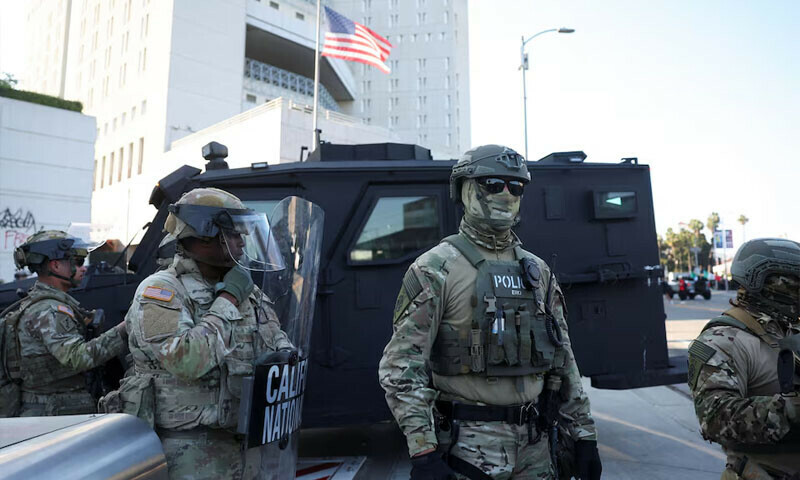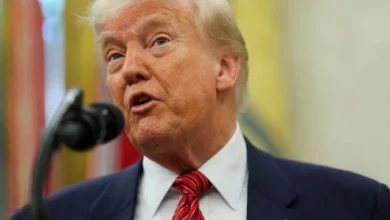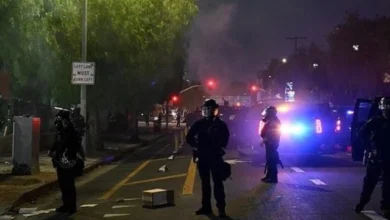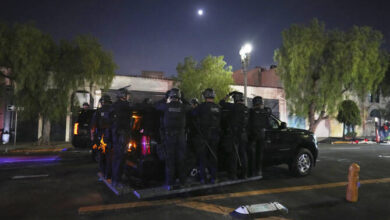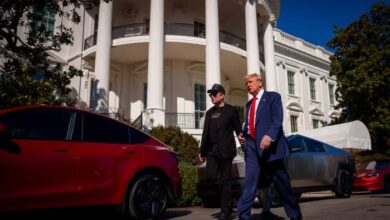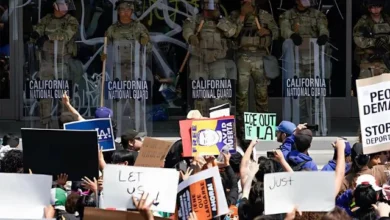A US appeals court on Thursday allowed President Donald Trump to maintain his deployment of National Guard troops in Los Angeles amid protests over stepped-up immigration enforcement, temporarily pausing a lower court ruling that blocked the mobilisation.
The 9th US Circuit Court of Appeals’ decision does not mean that the court will ultimately agree with Trump, but it does leave the command of the Guard with the president for now.
Earlier on Thursday, San Francisco-based US District Judge Charles Breyer found that Trump’s deployment of the Guard was unlawful. Breyer’s 36-page ruling had ordered the National Guard to return to the control of California Governor Gavin Newsom, who had brought the case.
It was a short-lived victory for Newsom, as Breyer’s order was paused about two and a half hours later. Asked for a comment, Newsom’s press office referred to the governor’s statement after the initial ruling and noted that the appeals court put a temporary pause on the ruling but did not reverse it.
“I’m confident, on the basis of the review of the 36 pages — absolutely it will stand,” Newsom said of the district judge’s order. Trump welcomed the ruling in a social media post on Friday.
The three-judge appeals court panel consisted of two judges appointed by Trump in his first term and one judge who was appointed by Democratic President Joe Biden. The panel said it would hold a hearing on Tuesday to consider the merits of Breyer’s order.
The court’s action called an administrative stay, gives the appeals judges additional time to consider the Trump administration’s request to block Breyer’s order while litigation in the case continues.
Trump summoned the National Guard on Saturday in response to protests that had broken out over immigration raids, then on Monday ordered the US Marines to support the Guard.
A battalion of 700 US Marines is expected to arrive on Friday, marking an extraordinary use of military forces to support civilian police operations within the United States.
The troops have stood guard at a federal detention centre in downtown Los Angeles where many of the protests have taken place in a show of solidarity for immigrants detained inside. The protests so far have been mostly peaceful, punctuated by incidents of violence, and restricted to a few city blocks.
The Guard had also accompanied Immigration and Customs Enforcement agents on operations to detain immigrants.
In his ruling, Breyer wrote that the presence of the troops in the city was itself inflaming tensions with protesters — a contention made by Los Angeles Mayor Karen Bass, among others — and depriving the state of the ability to use the Guard for other purposes.
Mayor wants ICE out of LA
Bass on Thursday called on ICE officers to stand down from the intensified series of raids that led to the protests, saying the local economy could be harmed as immigrants stayed home from work and school for fear of being snatched off the streets.
“The peace that we need to have happen needs to begin in Washington, and we need to stop the raids,” Bass told a press conference as supporters flanking her broke out in a chant of “Stop the raids.”
“Peace begins with ICE leaving Los Angeles,” said Bass, who has imposed a nighttime curfew over one square mile (2.5 square km) of downtown LA.
Bass spoke after Department of Homeland Security Secretary Kristi Noem pledged to “liberate” Los Angeles at a press conference that was dramatically interrupted when federal agents dragged Democratic US Senator Alex Padilla out of the room, forced him to the ground and handcuffed him.
The court battle and press conference scuffle underscored the political polarisation generated by Trump’s hardline approach to immigration enforcement and expansive use of presidential power.
Trump is carrying out a campaign promise to deport immigrants, employing forceful tactics consistent with the norm-breaking political style that got him elected twice. Democrats have said the use of military force was unnecessary and an example of Trump’s authoritarianism.
Between the rulings, Newsom said the National Guard would be redeployed to its previous tasks, including border security, preparing for wildfires and countering drug smuggling.
But the Trump administration immediately appealed the judge’s order, calling Breyer’s ruling “an extraordinary intrusion on the President’s constitutional authority as Commander in Chief.”
Trump justified the deployment of troops by characterizing the protests in Los Angeles as a “rebellion,” but Breyer said in his temporary restraining order that the protests fell far short of that legal standard.
“The Court is troubled by the implication inherent in Defendants’ argument that protest against the federal government, a core civil liberty protected by the First Amendment, can justify a finding of rebellion,” Breyer wrote.
Trump on Friday reiterated his comments that if he had not ordered the National Guard the city would be in flames, writing: “We saved LA.”

